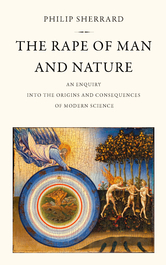
Philip Sherrard
The Rape of Man and Nature
An Enquiry into the Origins and Consequences of Modern Science
The growing threat of ecological disaster weighs heavily on people’s minds. In this book, first published nearly thirty years ago but still acutely relevant, Philip Sherrard traces the crisis back to what he believes is its true origin: the incremental replacement of a participatory and sacramental understanding of creation with the more detached scientific mentality that predominates today. Sherrard believes that by accepting this materialistic, mechanistic worldview we are contributing to our own dehumanization — with drastic consequences for the natural world.
Most people take for granted the assertion that modern science rests on pure, objective fact. For Sherrard such an assertion is, instead, a provocation. Modern science, he argues, emerged from developments in medieval Scholastic thought and is founded on a host of unquestioned philosophical and metaphysical assumptions. Only once we have understood more fully these assumptions and subjected them to close scrutiny may we begin to recover and reinvigorate the fuller vision of human life and the cosmos that the modern scientific perspective has replaced.
In bold, meticulous prose Sherrard makes his diagnosis of humanity’s present course in uncompromising terms. Yet he does not despair of a solution. There is nothing inevitable, he believes, in the unfolding tragedies of environmental despoliation, unbridled commodification and dehumanization, and cultural decay. Instead, Sherrard calls for a restoration of a sacred cosmology in which the spiritual regeneration of humanity and the ecological regeneration of the earth are seen as deeply enmeshed, in fact, as one and the same.
‘Through his sense of the sacred, through his emphasis upon the visionary intellect, and through his acute perception of the ecological crisis, Philip Sherrard is truly a prophet for our present age, a messenger whose winged words are addressed not so much to the twentieth century in which he lived as to the twenty-first century that is now unfolding.’ Metropolitan Kallistos of Diokleia.
‘One of the most powerful onslaughts on the modem scientific mentality to have issued from an Englishman's pen since the prophetic thunderings of William Blake . . . Its great merit lies in its locating within the Christian tradition a source of wisdom and spiritual depth which, for many of us brought up within that tradition, has proved sadly elusive.’ Jeremy Naydler in The Ecologist.
This new edition has been re-typeset and amended.
- 140 pages, 23.0 x 13.3 cm, 2015